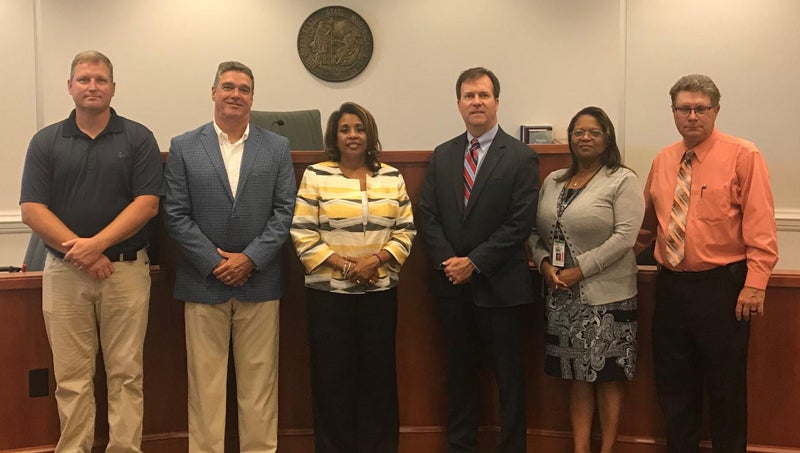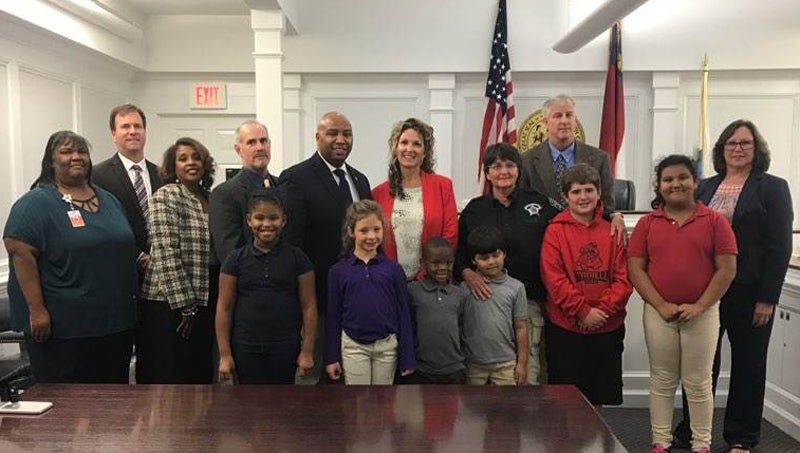Hyde, Tyrrell County launch School Justice Partnerships
Published 7:28 pm Wednesday, November 20, 2019

- HYDE HELPERS: Pictured, left to right, are Hyde County Board of Education Chair Randy Etheridge, Hyde County Schools Superintendent Stephen Basnight III, Chief District Court Judge Regina Parker, District Attorney Seth Edwards, Juvenile Court Counselor Supervisor Deborah Fonville, and Hyde County Sheriff Guire Cahoon. (N.C. School Justice Partnership)
From N.C. School Justice Partnership
Local community leaders joined Oct. 31 and Nov. 6 for signing ceremonies to announce the launch of the School Justice Partnership in Hyde and Tyrrell counties. The SJP agreement aims to keep kids in school and out of court by reducing law enforcement involvement in minor misconduct at schools.
On Oct. 31, Chief District Court Judge Regina R. Parker, District Attorney Seth Edwards, joined community leaders from Hyde County, including Sheriff Guire Cahoon, Superintendent Stephen Basnight III, School Board Chairperson Randolph Ethridge and Juvenile Court Counselor Deborah Fonville.
On Nov. 6, Parker, Edwards, Chief Court Counselor James Ward, Sheriff Kevin Sawyer, Superintendent Oliver Holley and Tyrrell County School Board Chair Lee Scripture, joined local community leaders to announce the launch of the Tyrrell County SJP.
The SJP is a group of community stakeholders — including school administrators, the law enforcement community, court system actors, juvenile justice personnel, and others — that will develop and implement effective strategies to address student misconduct. Currently, many students are suspended, expelled and referred to court for minor misconduct, which produces harmful outcomes for youth and their communities. Students who are suspended and expelled are more likely to repeat a grade, drop out of school, and engage in higher levels of disruptive behavior. A single suspension also triples the likelihood that a student will enter the juvenile justice system.

TYRRELL PARTNERSHIP: Pictured, back row, left to right, are Tyrrell County Student Services Director Cynthia Debreaux, District Attorney Seth Edwards, Chief District Court Judge Regina Parker, Tyrrell County School Board of Education Chair Lee Scripture, Tyrell County Schools Superintendent Oliver Holley, Tyrrell County Departement of Social Services Director Brandy Mann, Tyrrell County SRO Karen Simmons, Chief Court Counselor James Ward, Tyrrell County Clerk of Superior Court Angie Sexton. Front row, left to right, are Tyrrell County Students Ava Leigh, Harper Exum, Keneil Rawls, Edward Guzman-Chavrin, Henry Bryan and Genesis Gomez-Villanueva. (N.C. School Justice Partnership)
SJPs, which keep kids in school and out of court, produce better outcomes by timely and constructively addressing student misconduct when and where it happens, helping students succeed in school and learn from their mistakes. By improving individual student outcomes, SJPs will enhance the learning environment for all students.
There is evidence that SJPs work. Judge Steven Teske’s program in Clayton County, Georgia, known as the “Clayton County School Referral Reduction Protocol,” resulted in a 67.4% decrease in referrals to juvenile court, a 43% decrease in referrals of youth of color to juvenile court, and a 24% increase in graduation rates. Similar programs in Texas and Connecticut also have experienced positive results. In North Carolina, New Hanover County’s SJP resulted in a 47% decrease in referrals to the juvenile justice system in its first year. The Greene and Lenoir counties’ SJP hopes to produce similar outcomes for youth in this community.
The School Justice Partnership is a group of community stakeholders who work together to establish specific guidelines for school discipline in a way that minimizes suspensions, expulsions, and school-based referrals to court for minor misconduct. The main goal of the SJP is to keep kids in school and out of court for routine misconduct at school. SJPs are being developed throughout North Carolina as a result of the state’s recently enacted Raise the Age law.




